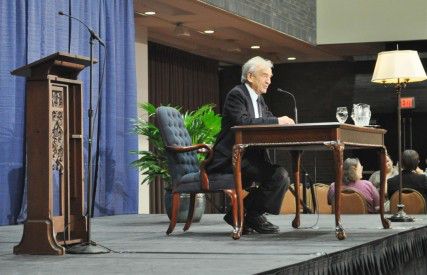In his first of three annual public lectures at Boston University, professor Elie Wiesel focused on how the prophecies of Ezekiel relate to today’s generations and the values society encompasses.

“I admire Ezekiel and I fear him,” Wiesel said. “He has a passion for truth, and for his love. He is the prophet of exile, yet Jerusalem is in him. He doesn’t dwell in the Holy City, but the Holy City dwells in him.”
Wiesel, a writer, Nobel Peace Prize recipient and Holocaust survivor, spoke before a crowd of more than 1,000 students, professors and Boston residents in Metcalf Hall Monday night for the lecture, entitled “In the Bible: Ezekiel and His Vision of Our Time.”
BU President Robert Brown introduced Wiesel.
“I have pride, because it is my pleasure to welcome Elie Wiesel, yet sadness because it is usually Dr. John Silber [who introduces him], who passed away this year,” Brown said.
The late Dr. Silber, president emeritus, recruited Wiesel to teach at BU more than four decades ago. Since 1976, Wiesel has been the Andrew W. Mellon Professor in the Humanities.
In his lecture, Wiesel weighed in on how the lessons from the Jewish prophet Ezekiel, who was exiled from Jerusalem, are especially important to generations today.
The book of Ezekiel is a story of a prophet unlike any other, namely because his story makes readers at first doubt God’s power, Wiesel said.
“Based on Ezekiel’s actions, we wonder are there no good people in the land, or no just men, you might ask,” he said. “You would wonder if God abandoned all of his people.”
Ezekiel’s story is relatable to the generation of Holocaust survivors because his story offers insight into the consequences of violence that could ultimately be applied to the future, Wiesel said.
“Professor Wiesel expanded on the lessons of these prophecies and what it means for us to be human beings,” said Joel Udwin, a School of Management junior and president of the Hillel Student Board.
“Ezekiel’s story applies to us today because we’re in an age where we need to step up and recognize our values, and see where we need to go to hold true to our values,” Udwin said.
Natalie Landau, a College of Arts and Sciences sophomore, said Wiesel’s talk reminded her of her Jewish heritage.
“Considering what Elie Wiesel has been through, and given that he’s still incredibly active, you can recognize that he’s really passionate about what he’s doing,” Landau said.
Wiesel said that Ezekiel was the first prophet to speak of Israel’s privilege and, because of his exile, he speaks to all generations about the dangers that could result from social structures.
“In his worst outbursts, Ezekiel declares his own nation ugly and repugnant,” Wiesel said. “But in his best, everyone radiates serenity. There is nothing in between. He is a man of extremes.”
Ezekiel’s solution to humanity can be applied today, Wiesel said.
“Ezekiel believed that suffering is always because of sin,” he said. “There is no pain, no death and no suffering if people do not sin.”
Jeremy Meltzer, a Sargent College of Health and Rehabilitation Sciences senior, said though he was not educated on the topic, he appreciated Wiesel’s expertise.
“The content was different, and I’m now going to do research,” he said. “Wiesel was very inspirational and very engaging.”
Aditi Amlani, a SAR sophomore, also said she knew little about the Book of Ezekiel, but Wiesel was able to make her understand how it applied to modern times.
“It was interesting to see how his experiences have shaped his insight into issues of today,” she said. “You can always learn from someone. Just by listening, I came away with something new.”
Landau said she especially was struck by Wiesel’s reference to the city of Jerusalem.
“When Wiesel said that Ezekiel wasn’t in Jerusalem, but that Jerusalem is in Ezekiel, it goes back to what I learned in Hebrew school,” she said. “Even though not every Jewish person can go to Israel, Israel is still in us because it is a part of our history and culture.”
Wiesel will hold two other lectures at BU, “In the Talmud: Is Martyrdom or Sanctification of His Name a Valid Response?” on Oct. 22 and “In Contemporary Writings: Open Heart” on Oct. 29.
This is an account occasionally used by the Daily Free Press editors to post archived posts from previous iterations of the site or otherwise for special circumstance publications. See authorship info on the byline at the top of the page.



